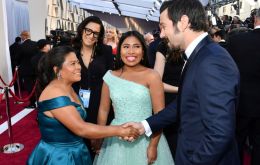MercoPress. South Atlantic News Agency
Tag: Oscar
-
Monday, February 10th 2020 - 08:37 UTC
Korean satire makes history by winning Oscar's Best Picture award

South Korean satire Parasite scored a stunning upset and made Oscars history when it won the Best Picture award– the first film in a foreign language to do so. Oscar's watchers had considered the Best Picture category a three-way race between independent social satire Parasite, British director Sam Mendes' immersive World War One movie 1917 from Universal Pictures, and Quentin Tarantino's love letter to show business, Once Upon A Time In Hollywood, from Sony Pictures.
-
Tuesday, February 26th 2019 - 10:36 UTC
Mexico disappointed indigenous actress Yalitza was left out of the Oscars' celebration

Cheers echoed through Mexico City’s Roma district when the eponymous film by Alfonso Cuaron won three Oscars on Sunday, but revelers let out a disappointed sigh when best actress didn’t go to the indigenous star of the ode to 1970s life in the capital. In a payback for Cuaron’s black-and-white tribute to growing up among 1970s Roma’s handsome villas and apartment blocks, city officials set up giant screens in a park to watch the live broadcast from Los Angeles.
-
Monday, February 25th 2019 - 09:12 UTC
Bohemian Rhapsody’s Rami Malek playing Mercury, wins Best Actor Oscar

Being neither a singer, dancer nor piano player, Rami Malek did months of research and took voice, movement, piano and guitar lessons in order to capture Mercury's accent, his strutting stage performances and the way he commanded a microphone.
-
Thursday, March 8th 2018 - 08:59 UTC
Oscar winning Fantastic Woman Chilean actress speaks of transgender inequalities

Chilean actress Daniela Vega made history by becoming the first transgender presenter at the Oscars ceremony. But, at a news conference after meeting Chile's President Michelle Bachelet this week, she spoke of the inequalities transgender people face in her home country.
-
Monday, March 5th 2018 - 08:51 UTC
Chilean film wins Oscar for best foreign language film, and is an icon for LGBTQ

Taking home the Academy Award for best foreign-language film, Sebastian Lelio's drama became the first-ever Chilean film to win an Oscar. But, more importantly, it marked a breakthrough in transgender cinema. The Spanish-language feature, about a trans woman who faces bigotry and intolerance after her partner dies, has become a touchstone for an entire movement, and the film's star, trans actress Daniela Vega, its spokeswoman.
-
Monday, March 5th 2018 - 08:45 UTC
Gary Oldman takes the Oscar for his performance as Winston Churchill

Gary Oldman took home gold for his performance as Winston Churchill in the historical drama “Darkest Hour” at the 90th Academy Awards on Sunday night.
